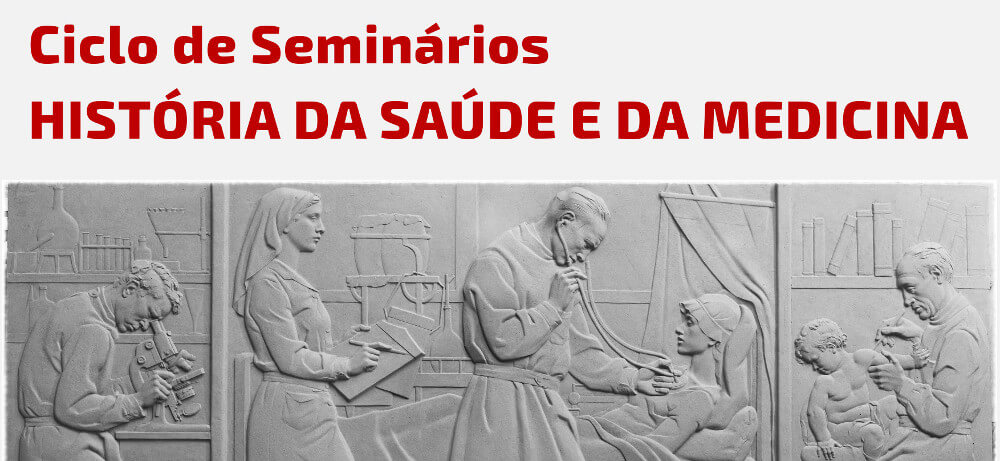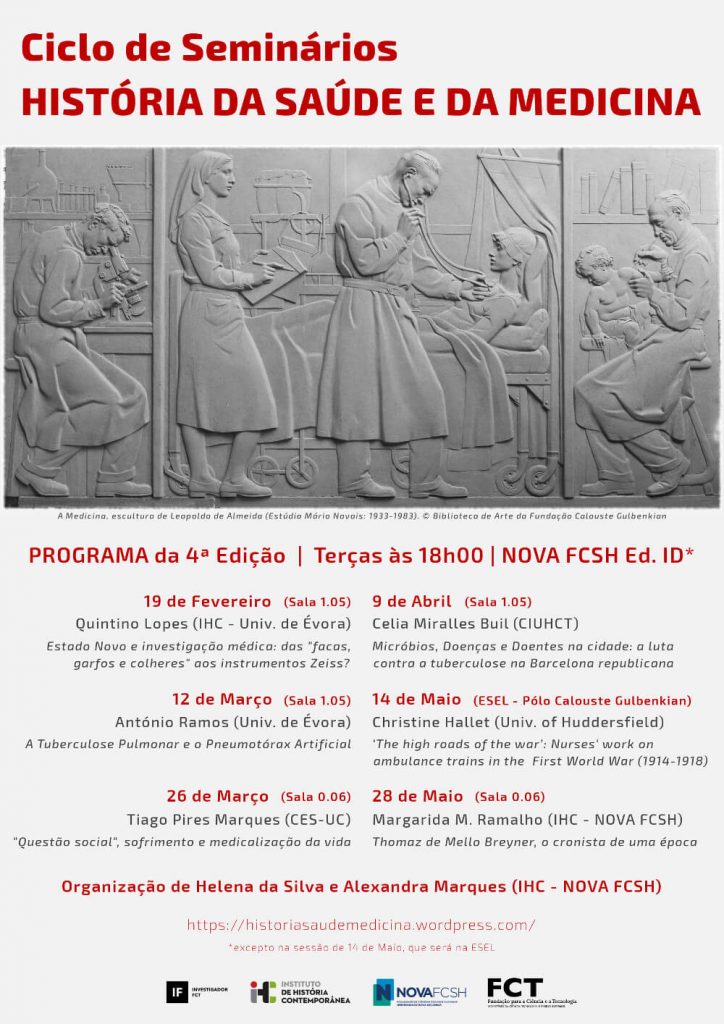maio, 2019

Detalhes do Evento
Quinta sessão da quarta edição do ciclo de seminários História da Saúde e da Medicina, organizado por Helena da Silva e Alexandra Marques. Com
Ver mais
Detalhes do Evento
Quinta sessão da quarta edição do ciclo de seminários História da Saúde e da Medicina, organizado por Helena da Silva e Alexandra Marques. Com Christine Hallet (University of Huddersfield).
Este ciclo de seminários pretende ser um espaço de debate historiográfico sobre a História da Saúde e da Medicina, numa perspectiva pluridisciplinar e num contexto espácio-temporal alargado.
Nas diferentes sessões, será apresentada a investigação em curso pelos conferencistas com o intuito de promover o conhecimento e a reflexão na História da Saúde e da Medicina. Diferentes vertentes serão abordadas, quer uma visão científica e prática, quer em termos políticos, sociais e institucionais.
PROGRAMA 2019
19 de Fevereiro
Estado Novo e investigação médica: das “facas, garfos e colheres” aos instrumentos Zeiss?
Quintino Lopes (IHC – Universidade de Évora)
12 de Março
A Tuberculose Pulmonar e o Pneumotórax Artificial
António Ramos (Universidade de Évora)
26 de Março
“Questão social”, sofrimento e medicalização da vida
Tiago Pires Marques (CES-UC)
9 de Abril
Micróbios, Doenças e Doentes na cidade: a luta contra a tuberculose na Barcelona republicana
Celia Miralles Buil (CIUHCT)
14 de Maio – Esta sessão decorre na Escola Superior de Enfermagem de Lisboa e tem início às 17h30
‘The high roads of the war’: Nurses’ work on ambulance trains in the First World War (1914-1918)
Christine Hallet (University of Huddersfield) — 📎 Resumo e biografia
Work on an ambulance train was a highly desired posting for British military nurses during the First World War. Transport nurses travelled to railheads within a few miles of the fighting, and performed essential, sometimes life-saving, work which was viewed as an integral part of the war-effort. Early in the war, men were entrained with the mud of the battlefield still clinging to their bodies and uniforms, their injuries protected only by first field dressings and their general conditions weakened by lack of food and water. From the winter of 1914-15 onwards, they were taken on from casualty clearing stations (CCSs) where they would have received necessary treatment, including shock therapy, emergency surgery, wound care and feeding. The work of transport nurses therefore changed as the war progressed. The need to improvise and offer emergency care gave way to the requirement to implement some highly sophisticated techniques, including wound irrigation and tube feeding. Nurses were responsible for stabilising and sustaining patients on long, slow journeys from CCS to base. The purpose of the paper is to examine and interpret the ways in which transport nurses gave meaning to their highly autonomous and responsible roles, in which decisions had to be taken rapidly, sometimes without medical support, and orderlies had to be closely supervised. Drawing upon a range of primary sources, including nurses’ letters, diaries and official narratives, the study considers both the nature of nurses’ work and the ways in which they evaluated their wartime experiences. Being ‘close to the action’ was highly valued; but nurses gave the greatest significant to experiences in which they successfully solved ‘nursing problems’, enabling them to offer expert physical and emotional care in the cramped, crowded and unstable environment of a moving train carriage.
28 de Maio
Thomaz de Mello Breyner, o cronista de uma época
Margarida de Magalhães Ramalho (IHC – NOVA FCSH)
Tempo
(Terça-feira) 5:30 pm - 7:30 pm
Localização
Escola Superior de Enfermagem de Lisboa – Pólo Calouste Gulbenkian

